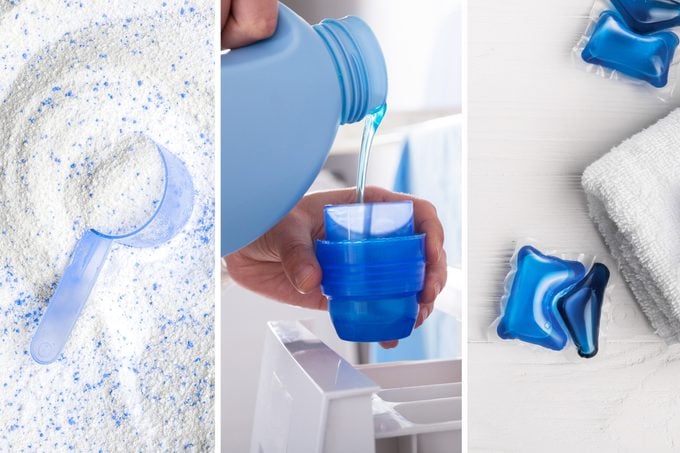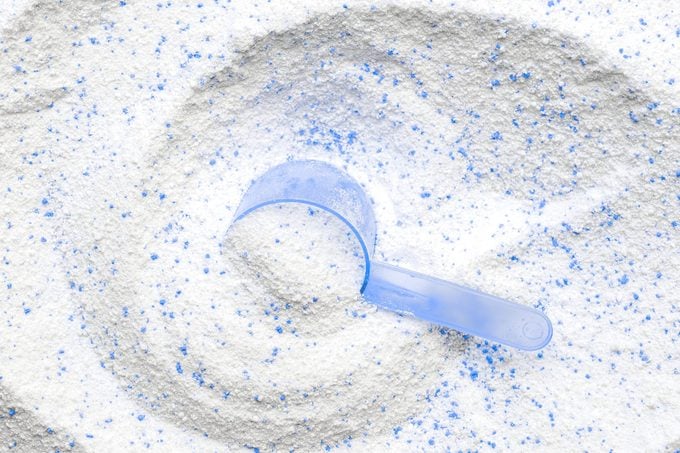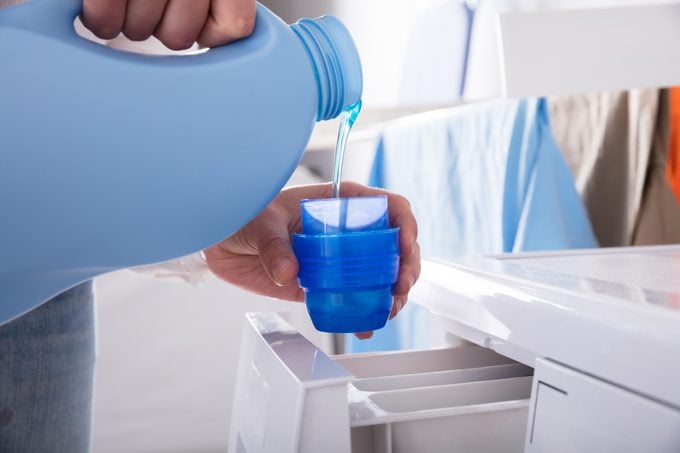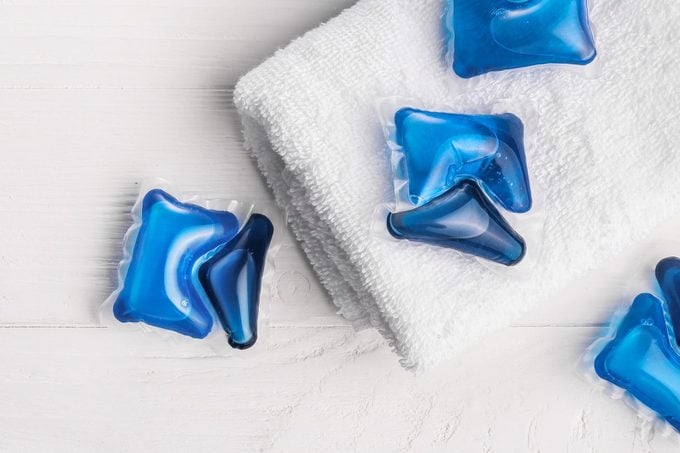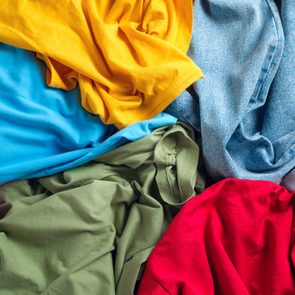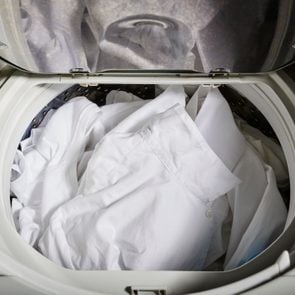Liquid vs. Powder Detergent vs. Pods: Which Is Best to Use?
Laundry experts break down the pros and cons of powder vs. liquid detergent vs. pods, making your choice that much easier.
Our editors and experts handpick every product we feature. We may earn a commission from your purchases.
When it comes to the best laundry detergent, options are endless. Is your idea of perfume a freshly laundered shirt? You can invest in one of the best-smelling laundry detergents. Does your skin rebel in the face of harsh soaps? Stock up on laundry detergent for sensitive skin. Are you concerned about washing clothes in chemicals? Pick among the safest laundry detergents. All of that is a great start, but it doesn’t touch on the biggest clothes-washing decision: powder vs. liquid detergent vs. pods.
Which type of detergent is tops? Well, experts say the choice of powder vs. pods vs. liquid detergent depends on what you’re looking for. For instance, powder is cheap, lasts a long time, produces less waste, and is great for heavily soiled clothes. Liquid detergents, on the other hand, work better in cold water, are easier to measure, and can be used as spot treatments or when hand-washing clothes. And pods are easy to use, light and portable, and make zero mess.
How you use these detergents is critical too. There are specific tips for how to use laundry pods, for example, just like there are specific tips for how to use fabric softener and how to separate laundry. Here, we break down the pros and cons of each type of laundry detergent so you can understand which one is the best—and how to use it most effectively. Oh, and after you’re done, make sure you check out this shirt folding board to save yourself hours spent on neatly folding laundry.
Powder Laundry Detergent
Pros:
- Less messy than liquid detergent
- Tends to be cheaper per load than liquid or pods
- Generally more shelf-stable than liquid or pods, so it will last longer
- Has more eco-friendly packaging
- Amount of powder used per load is customizable
- Lightweight compared to liquid detergents
- Works well on heavily soiled clothes, such as sports uniforms
Cons:
- Some powder detergents have trouble dissolving in colder water, which can leave residue on clothes
- Can be used for pretreating clothes, but you need to make a paste or dissolve it first, adding an additional step to your laundry routine
- Needs to be kept dry
- Messier than pods
Best for
Powder detergent is a smart pick for extra-dirty loads, says Mary Gagliardi, aka “Dr. Laundry,” Clorox’s in-house scientist and cleaning expert. “Powder detergent is usually formulated at a higher pH, which can optimize cleaning of heavily soiled work clothes and sports uniforms,” she says.
Laura Johnson, a research and development expert with the LG Electronics home appliances lab, points to money- and environment-saving benefits. “Powder detergent is best for consumers who are looking for eco-friendlier packaging,” she says. “It’s also a better budget option for consumers.”
Expert tips for using powder laundry detergent
Use warm or hot water: When using powder detergent, it’s important to know what temperature to wash clothes. “Avoid using very cold water, unless the powder detergent states it’s designed to dissolve in cold water,” Johnson advises. That’s because some powders struggle to dissolve in cold water. If you prefer a powder vs. liquid detergent and also want to wash in cold water, “pre-dissolve the powder in a little warm water before adding it to the washer,” Gagliardi suggests.
Measure carefully: When choosing a powder vs. liquid detergent, rely on the measurements on the package. “Follow the instructions on the package for the amount of detergent and water recommended to make the presoaking solution as well as the time limit for how long to soak an item,” Gagliardi says.
Check the ingredients list: For a deep clean using a powder vs. liquid detergent or pods, pick a product with the right ingredients. “Make sure your powdered detergent includes enzymes and fluorescent whitening agents in addition to the cleaning agents,” Gagliardi says. “Not all detergents are the same, and it’s worth it to get a ‘good’ one.”
Liquid Laundry Detergent
Pros:
- The detergent is already dissolved, so there’s no chance of residue
- Dissolves better in colder water than powder detergent
- Can be used as a spot treatment for many stains, negating the need for another product
- The cap allows for easy measuring
- Can be used for hand-washing garments
- Works well on oil and grease stains
Cons:
- Can be very messy
- Often heavy and cumbersome
- Creates more plastic waste for the environment
- Pours quickly, upping your chances of over-dosing detergent
Best for
Wash a lot of clothes in cold water? This is the detergent for you. It dissolves well no matter the water temperature. “Liquid detergent disperses easily in cold water temperatures, so a person who wants to exclusively use cold water [usually for energy savings] would be more likely to use a liquid detergent,” says Gagliardi.
This type of detergent is also good at removing oil and grease stains. “Consumers who tend to have more of those types of stains will have good results with liquid detergent,” Johnson says.
Expert tips for using liquid laundry detergent
Measure carefully: “Measure carefully when using liquid detergent,” Johnson cautions. “Too much detergent over time can lead to buildup in the washer, which can lead to odors.” The cap makes it easy to moderate how much detergent to use. “The cap will have lines showing how much to use, adjusting for load size and soil level,” says Gagliardi.
Use it to treat stains: “To pretreat, rinse the stain with cold water to remove any excess, then pour enough detergent onto the garment to cover the stain,” says Jessica Zinna, PhD, a senior scientist with Tide. “Use a soft-bristled toothbrush to help spread the detergent into the fibers of the garment, or rub the fabric together gently, then wash as you normally would.”
Use high-efficiency detergent for high-efficiency machines: “If you have a high-efficiency washing machine, make sure to use a liquid laundry detergent designed for HE washers,” Zinna says. Finding HE detergent is easy: Just look for the “he” symbol on the package.
Psst! You might want to check out our list of the best washing machine cleaners, too.
Laundry Detergent Pods
Pros:
- No need to measure detergent
- The lightest option—no heavy bottles or boxes to move around
- Zero mess
- Easy to use
- Contains concentrated detergents
Cons:
- Most expensive laundry detergent option
- Can contain too much detergent for smaller loads and can’t be cut in half
- Potential for poisoning because the brightly colored packets can look like candy to young children
- Can’t be used for pretreating clothes
- Have lots of plastic packaging, which adds to the environmental impact
Best for
Pods are best for people who tend to have the same size loads all the time and have laundry that isn’t very heavily soiled, according to Johnson. They’re also the least messy and easiest to transport, which is why they’re a good pick for people using communal laundry rooms.
Expert tips for using laundry pods
Store them safely: Pods pose a risk of poisoning if ingested and chemical eye burns if the detergent touches the eye. That’s why you should always store them in a child-proof container out of reach of young kids. “Pods must be kept in their original packaging—don’t give in to the temptation to transfer them to a cute container that allows you to see them,” says Gagliardi. That’s because, in addition to having all the important safety information handy, “packaging for detergent pods is opaque, so the pods won’t be visible and therefore are not appealing to children.”
Put the pod in first: Throw your laundry pod into the washer first, then add your clothes. “If pods are thrown on top of clothes, they might not dissolve fully,” Johnson says.
Use the right number of pods for your machine: Some of the best washer and dryers are on the larger side, which means you can launder more clothes at once. But that can make it tough to know exactly how much detergent to use. “Because washing machines are getting larger, it’s important to use the right amount of liquid laundry packets, which is often two or three for a large-size load in a high-capacity washer,” Zinna says.
Next, read up on this homemade laundry detergent recipe that’s effective and simple to make.

